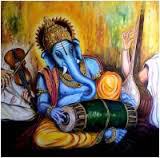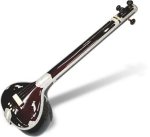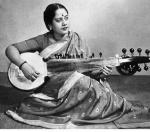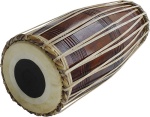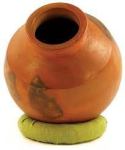CARNATIC AND HINDUSTANI
Very few cultures in human race are gifted with rare acumen of producing, creating soulful music. Hindus are one such a gifted and unique species which is why India is home to not just one but two genres of Desi Classical Music: the Hindustani stream of the north and Carnatic classical of the south (apart from native classical dance forms from every other state that merit a separate write-up in their own right).
The aim of this post is to make a brief, if not complete, record of Hindu contribution to world music (by way of music instruments only). So this list is not exhaustive. There is scope for future additions.
India’s native classical instruments comprising the Stringed ones (like Sitar and Veena), Percussion (drums such as Mridangam and Tabla) and Wind (like the Bansuri) command a special place in global music stage, with Sitar and Tabla adapted by a wide range of western music followers. An array of other instruments vastly remain unpopular, although thriving in local scene, with the music tradition dying a slow death in some cases as in rural/folk country.
Hindus revere musical instruments which find a place in ritual worship by way of ‘puja’ (service), the highest respects, tributes, mankind can ever give these finest creations of God who gifted us the basic ‘Sapta Swaras’ (the seven notes of scale) that form the core of all sounds/tunes and beats (raags and taals) in universe. Simply everything is contained in ‘Sapta swaras.’ There is no sound or vibration that is out of scope of ‘Sa Re Ga Ma Pa Da Ne’ right?

We Hindus believe, Veena is the instrument of the very Goddess of learning/knowledge/wisdom Mother Saraswathi. If Saraswathi reigns supreme, Lakshmi, the Goddess of wealth/fortunes and Shakthi, the Goddess of power/energy/strength cannot be far behind.
Lord Ganesha is revered as the master of drums.
India thus is this divine home where we view everything – including inanimate objects like music instruments, as life.
Our classical traditional instruments have less and less number of learners, teachers (gurus) and followers these days which is a big concern. This precarious situation endangers the transition of our native and pedigree music passed on over the millennia from our ancestors, to next generation. The music scene in Chennai, the gateway to Indian culture, is vibrant. Chennai is home to Carnatic attracting thousands of classical music exponents and disciples from around the world during the famous December Music Season (Margazhi). But of late, even here we see vocal music gaining an overwhelming predominance over instrumental music which is kind of sad. Very few youngsters take to Indian instruments these days and interest is waning.
In Hindu culture, music translates to spirituality. Music is essentially a form of ‘bhakthi.’ Bhakthi and Music intertwine in search of the ultimate bliss: Nirvana. That is why we have Meera Bhajans for instance or even the Thiruppavai-Thiruvembavai (in Tamil Nadu). The ‘Divine Being’ for Hindus revels in soulful music.’ Meera sang to her eternal love Krishna and her renditions are timeless.
Bansuri, the flute, is also the instrument of Lord Krishna, played in India for eons. The western flute version differs slightly from original desi version. Called ‘Pullankuzhal’ in tamil, the south Indian flute is also a tad different from the northern Indian bansuri. Thus there is not a thing that Hindus did not discover or invent in an ancient civilization that pre-existed the current one.
The amazing north-south sync in the Indian classical music versions north & south of Tropic of Cancer is brilliant: The Sitar of north’s equivalent in the south is Veena. The Mridangam from down under finds a mate in Tabela (tabla) up north. The Nadaswaram (nagaswaram) played in south Indian weddings is substituted with Shehnai or Shenoy without which there is no north Indian wedding.
‘Yaazh’ (as proncounced in ‘Yaazhpaanam’ a Tamil city in Sri Lanka) is a unique ancient Thamizh stringed musical instrument. ‘Jalatharangam’ also specific to India played with bowls of varied sizes with different levels of water, gives a rare musical vibration.
Pranaams to Hindustani/Carnatic Classical and Folk Music traditions of Bharath (India)!
Computerized synchronization is killing traditional and native classical instruments of India in such an obscene fashion. Art is dying, artisans are dying because of electronic synthesis of our musical reverberations, even if it can be argued that this is one more step in evolution of music. Is it really possible to produce the ‘ghamaka’ of Veena cent percent with computers? No way! The finest nuances of Veena can be produced only in the instrument.
There are deliberate, steady and systematic designs and manipulations to trivialize, devalue, discredit and even disinherit (us of) and usurp anything and everything Hindu by gene, culture & heritage by some quarters, which is highly alarming. Aryabhatta was indeed the world’s first astronomer. Sushrutha was the world’s first plastic surgeon unquestioningly. Bhaskara did give the world Calculus and Trigonometry and Hindus did invent the Zero concept. Ayurveda to Yoga and Meditation, there is not a field ancient Hindus did not touch or pioneer in. Everything ground to a standstill by 7th century CE. Why. We Hindus never bother about patents either. Vasudeiva Kudumbakam, World is one family for us.
I have a request before I close: Dear Indian parents, PLEASE ENROLL YOUR KIDS FOR CLASSICAL INDIAN MUSIC INSTRUMENT TRAINING rather than aspire for Dance shows in television channels. You will be rendering yeoman service to Bharat Matha, Mother India.
